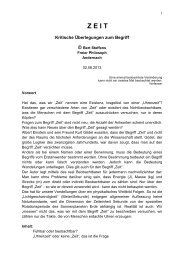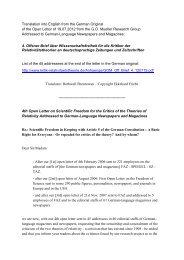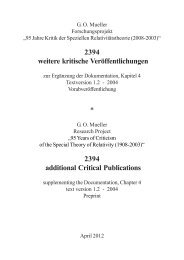1. The Need of New Approaches - Kritische Stimmen zur ...
1. The Need of New Approaches - Kritische Stimmen zur ...
1. The Need of New Approaches - Kritische Stimmen zur ...
Create successful ePaper yourself
Turn your PDF publications into a flip-book with our unique Google optimized e-Paper software.
2012<br />
Chapter 9: <strong>The</strong> Thought Experiment<br />
A Vindication <strong>of</strong> Honour and Optimistic Perspectives<br />
Naturally enough, there are no great perspectives in disclosing to the public in the space <strong>of</strong> a few years an 85year-old<br />
and well-installed, secret system <strong>of</strong> deceit and deception in all its criminal beauty. However, the research<br />
project can realistically provide at least the historically important evidence that not everyone has been raked in by<br />
this organized stultification.<br />
This vindication <strong>of</strong> honour for the future by the historical evidence that a few independent thinkers had seen<br />
through, denounced and survived the mental terror and the generally prescribed brainwashing, would in itself have<br />
been a sufficient reason for justifying the effort and expenditure that has gone into the project. <strong>The</strong> intellectual<br />
resistance against the imposed nonsense could only be concealed, but could never be broken.<br />
Max Planck’s noble hope as to the dying out <strong>of</strong> the critics has not come to pass. This thought makes one<br />
optimistic, despite the current total suppression. To pass it on is another new approach taken by our project.<br />
Max Planck’s much-quoted comment:<br />
“An important scientific innovation rarely makes its way by gradually winning over and converting its opponents;<br />
it rarely happens that Saul becomes Paul. What does happen is that its opponents gradually die out and that the<br />
growing generation is familiarized with the idea from the beginning.” (M. Planck: „Ursprung und Auswirkung<br />
wissenschaftlicher Ideen.“ Lecture, 17.2.1933. In: „Planck: Wege <strong>zur</strong> physikalischen Erkenntnis.“ 2nd edition,<br />
Leipzig 1934, p. 267.)<br />
is always circulated by the relativists as a great brainwave, though it is actually only the height <strong>of</strong> primitivism,<br />
in that he denies the decisive role <strong>of</strong> the dispute and perceives scientific progress solely as a timely drumming in<br />
with the mallet. And that’s exactly how progress is seen in the context <strong>of</strong> the theory <strong>of</strong> relativity.<br />
Just recently a publisher <strong>of</strong> the daily newspaper Frankfurter Allgemeine Zeitung [FAZ] acclaimed the Planck<br />
quote as a great piece <strong>of</strong> wisdom (FAZ, 5.8.08: F. Schirrmacher, “Der Solschenizyn-Schock”).<br />
Planck’s claim that the dying-out <strong>of</strong> the critics is the reason for the acceptance <strong>of</strong> a new idea can be simply<br />
refuted with the indication that it is only the convincing argument which can persuade the public; for example the<br />
question why „down-under“ one would not fall <strong>of</strong>f the earth has been answered and explained by the discovery <strong>of</strong><br />
gravity - and not the dying out <strong>of</strong> any “unbelieving”.<br />
Max Planck wanted to justify a false physics with a falsified history <strong>of</strong> physics. This first recognition <strong>of</strong> Planck’s<br />
history <strong>of</strong> physics is also a new and necessary approach.<br />
Open Letters Against the Great German Excuse<br />
In the course <strong>of</strong> the 20th century, after the collapse <strong>of</strong> totalitarian regimes, our society has already successfully<br />
flown twice behind the great German Excuse:<br />
We didn’t know anything.<br />
We didn’t do anything.<br />
If we hadn’t done it, others would have done it.<br />
Our existence would have been at stake, if we had refused.<br />
To avoid, in good time, any repetition <strong>of</strong> such a spectacle as it was delivered after the collapse <strong>of</strong> the two<br />
totalitarian regimes in Germany and now can be expected after the fall <strong>of</strong> Relativity, our project has not only sent<br />
individual letters to the addressees since 2001, but has also published many „open letters“ since 2005 intended for<br />
specific addressee groups.<br />
<strong>The</strong> instrument <strong>of</strong> the open letter, or other forms, is well known and is chosen by many persons and groups as<br />
a means <strong>of</strong> attracting the attention <strong>of</strong> the public to their concerns. Few such efforts from critics <strong>of</strong> the special theory<br />
<strong>of</strong> relativity are known to us:<br />
9<br />
G. O. Mueller: STR





